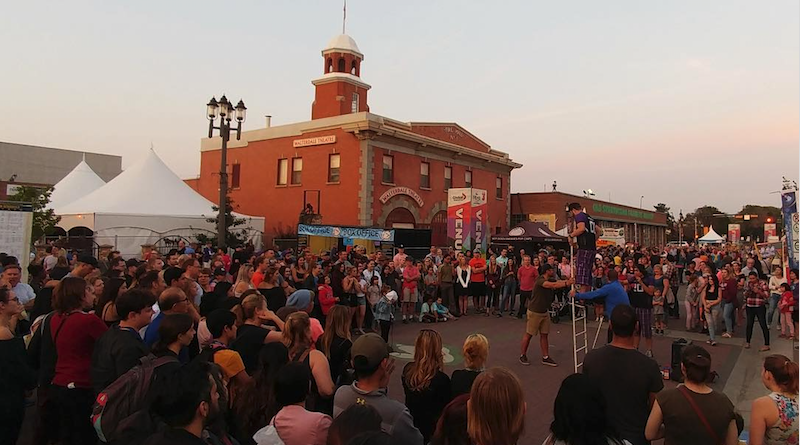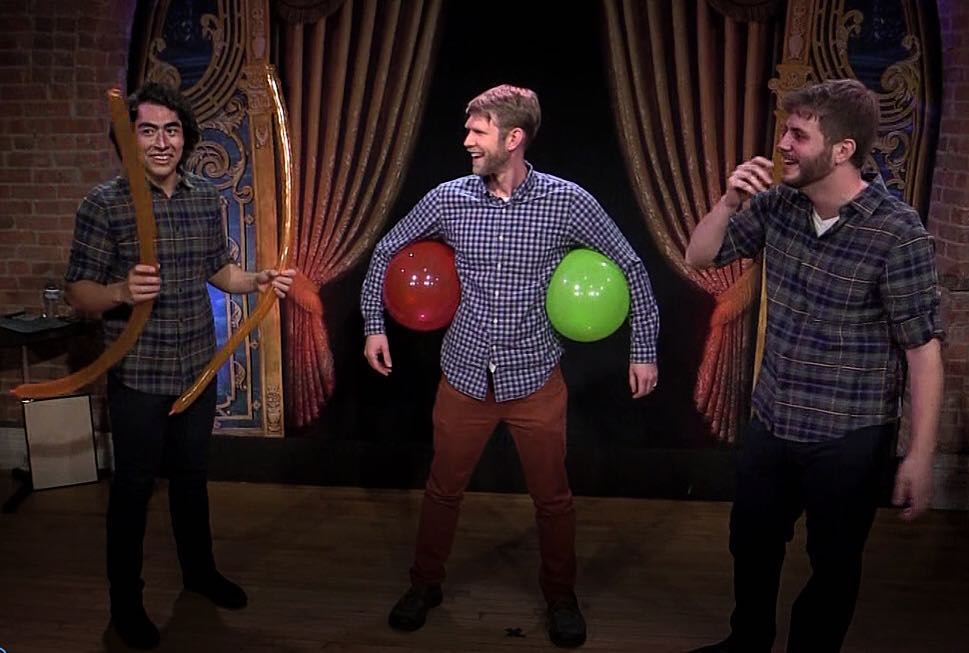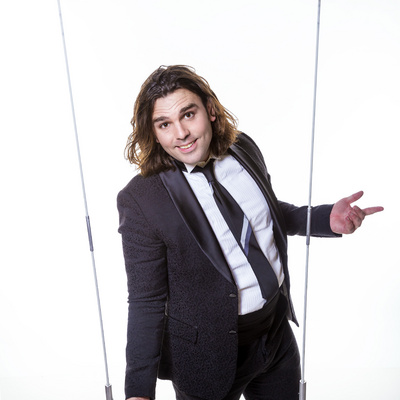Devising Circus on the Fly: Lessons from the Plaid Lads

The Plaid Lads, a duo comprised of Sam Malcolm and Tony Steinbach, are darlings of the fringe world, having performed from coast to coast in North America. They’re both successful touring solo acts –working mostly as jugglers and stand-up comedians — but they also work on duo material when their schedules align. Most recently, they performed at the Edmonton International Fringe Festival with solo shows and their Plaid Lads Mega-show. (A show they describe as “…an incorporeal mass of comedy… where they [wow] audiences with their off-the-cuff humor and skillful mastery of juggling.”) In Edmonton, Tony walked away with the “Best Outdoor Show” accolade, and Sam walked away without setting anyone on fire — big victories by any juggler’s standard.
On their way back home,Malcolm and Steinbach were invited to perform at a meet-up of theCincinnati CircusCompany (CCC), a gathering of jugglers, magicians, and entertainers who work under the CCC banner. They are long-time friends of the CCC management, and decided to tailor a 30-minute show just for them… six hours before showtime. To make things more difficult, they decided not to use their staple discipline( juggling) at all in the show. Instead, they built an entirely new piece based on public safety videos centered around the dangers of learning to perform magic. I’ve known Sam and Tony for the past ten years, and it was surprising to see them skip over their standard material (not even keeping juggling props nearby as a failsafe in case things didn’t work!) This was risky business, and the result was a case-study in performing for performers. After I heard about their challenge, I had to learn more.
Thom Wall: Can you elaborate on where your show concept came from?
 Tony Steinbach: We wanted to write something completely new, both to show the CCC but also to challenge ourselves to make something new that we would also be happy with. I threw out the idea of an anti-drug school assembly and Sam immediately started riffing with it. We had a six-hour drive ahead of us, so that became the limitation. We decided to perform something that could be written and planned in that six hours.
Tony Steinbach: We wanted to write something completely new, both to show the CCC but also to challenge ourselves to make something new that we would also be happy with. I threw out the idea of an anti-drug school assembly and Sam immediately started riffing with it. We had a six-hour drive ahead of us, so that became the limitation. We decided to perform something that could be written and planned in that six hours.
Sam Malcolm: Yeah, we were talking about how we didn’t want to just do our normal show as a demonstration since it wouldn’t highlight the skill in performing so well to new performers. We also both like the challenge of getting outside our comfort zones. It’s an exercise in trust to be able to impromptu write a show with another person. We felt like all of this would be good for us and we’d be able to explain our process easier by starting from that standpoint.
TW: I totally get what you mean by trust in your partner. There’s a real chemistry that you have to develop with someone you perform with – being able to confidently set jokes up for their punchline, and to know that you’re both working in the same rhythm. Back when Curtis Carlyle and I used to perform regularly, we had a similar exercise to what you guys just did – we’d write a routine in the morning, rehearse in the afternoon, and put it up at an open stage that night. Rinse, repeat. There’s a real challenge when working on new material and staying fresh as partners, especially when you’re based so far apart. How do you guys stay connected?
TS: I’d say on average Sam and I talk on the phone for six or seven hours over the course of a week. That helps us keep in tune, especially leading up to when we’ll be performing together. When we meet up there’s usually an adjustment period for the first day, and then we start to sync up. We take a lot of care to make sure the other one feels comfortable, especially when one of us is staying with the other one. It’s actually a lot easier to write from a distance, but we don’t have the ability to try things out until we see each other. So we can come up with all of the ideas we want, but there’s no way to have the immediate feedback that you get when you’re physically next to each other.
We also take a lot of time to do non-comedy/performing things together. When we’re together we play basketball against each other almost every day. That also helps with syncing up because it forces you to anticipate the other one’s actions.
TW: Watching the video, it seems like you guys got some big laughs here and there, but other lines seemed to fall flat. Were there any moments where you thought “Oh no, this isn’t going quite how we expected…”
 SM: The show went pretty much exactly how we expected. Jokes don’t always land, which is something you learn to work through doing comedy. Both of us felt confident in the rhythm of the laughs we got and knew the risks we were willing to take. Less of a “Oh no this isn’t working!” and more of a “Hey, they liked that– let’s see how far we can push this.” This is the same approach we use for those videos we post onInstagram. Another thing we always consider is that just because people don’t laugh loudly at every joke doesn’t mean they don’t think it’s funny. How often do you laugh out loud when you’re reading something funny on your phone?
SM: The show went pretty much exactly how we expected. Jokes don’t always land, which is something you learn to work through doing comedy. Both of us felt confident in the rhythm of the laughs we got and knew the risks we were willing to take. Less of a “Oh no this isn’t working!” and more of a “Hey, they liked that– let’s see how far we can push this.” This is the same approach we use for those videos we post onInstagram. Another thing we always consider is that just because people don’t laugh loudly at every joke doesn’t mean they don’t think it’s funny. How often do you laugh out loud when you’re reading something funny on your phone?
TS: Exactly. I can’t speak for Sam, but the entire show went much smoother than I expected. The jokes that we expected to work did, and for a partial improv show, I thought it went extremely well.
TW: That’s a really good point. I think it was either Scotty Meltzer or Dan Holzman who said something like “Not every joke is A-material, but every joke shouldn’t beA-material” – meaning that you need to have a rolling tide of laughs – if everything is super heavy-hitting and nonstop, audiences can get tired. Maybe the show in Cincinnati isn’t a good place to reflect on this idea, since the material is so young – but do you have a similar philosophy in your own work?
TS: This philosophy is something I’ve actually struggled with greatly, but in the context of learning how to present juggling. There was a while where my performances were really in-your-face finale after finale after finale marathons. And while there’s merit in approaching some performances like that, it’s also unsustainable for a lot of circumstances.
TW: Do you think there’s a beef between the magic world and the juggling world? Are you often called a “magician” in your working life?
TS: I’ve definitely been called a magician, but I don’t really think there’s much of a beef. We’re just easy targets for each other. I work at Penguin Magic’s theater all of the time and trade good natured jabs with the magicians.
SM: For sure. It’s completely fabricated. To me it always seemed sort of tongue-in-cheek that jugglers and magicians would be “rivals” since the people attracted to doing one usually are interested in doing both. If there is a real “beef” I’d say it’s more of along the lines of irreconcilable similarities.
TW: What kind of response were you expecting when you wrote this bit?
SM: Just like anything new, we planned for complete failure and figured if any of it worked we’d be able to salvage the material that we liked and learn from the stuff that didn’t work. Which is still pretty much what we did but the response was overwhelmingly positive.
TS: Haha, yeah…I expected most people to like it and for the magicians who didn’t know us to be a bit annoyed. At the end, though, we only got positive feedback.
TW: Was there a bigger thought behind the idea of doing little juggling and more sketch comedy? In the wider picture, was this a fun way to create new material? Or did you set out with a particular agenda, in terms of your creative process?
 TS: There was definitely reason behind it. At least for me, magic in the routine represents prepackaged shows, things that other people have made and sold (or performers have taken) where the routine basically uses them as a puppet.
TS: There was definitely reason behind it. At least for me, magic in the routine represents prepackaged shows, things that other people have made and sold (or performers have taken) where the routine basically uses them as a puppet.
We were asked to come do a show for CCC to help expose their performers to acts outside of the company– which has many acts that are very physical-skill based– so we wanted to go out and be entertaining for 30 minutes while also doing as few tricks as we possibly could, and for those tricks to be purposefully unimpressive.
We also wanted to show how to write a routine that’s customized for its audience. I don’t think that it would have been as entertaining or enjoyable for an audience that wasn’t familiar with performance and variety arts. And that’s what we wanted–we wanted a targeted performance that would be engaging for those watching.
We also wanted to use this as a demonstration of putting yourself out there with new material. For me personally, I only grow by trying new things and forcing myself to perform outside of my comfort zone.
SM: Right. The truth of the matter is, we were both at the end of a long stretch of performing our solo shows and this was a bit of a break. Another thought was that we weren’t going to have much time to warm up and practice any new juggling before the show. We also decided that it would be a better example of performing as a skill if we didn’t make juggling the focal point.
TS: A good performer can make whatever they need to entertaining or at least presentable, someone who is a good performing juggler/magician/musician/poet focuses on making that skill entertaining and presentable.
TW: Given this experience, what kind of advice might you give others in a similar situation? What pertains to improv actors, people working on tight schedules, or other comedian/variety performers?
SM:If you’re afraid of failing writing a new show in four hours might not be for you. But it’s still fun and I think if you’re willing to explore new ideas that’s what should matter most. Make it fun. We wouldn’t have explored this idea at all if it wasn’t something we thought was fun to begin with.
TS:Use your time! Sam and I wrote this entire thing on a drive. Don’t be afraid to take risks, especially when it comes to something new. Use opportunities like this one to try to expand yourself as a performer and don’t take it very seriously. Not every joke or trick or routine will hit right away, savor the ones that do and work on the ones that don’t.
SM: With any kind of writing, you know you’re presenting it to people who all have different experiences, opinions, tastes and levels of playfulness, but I’d hate for the idea of someone not liking something I create to keep me from creating something I like. I think we did a pretty good job there.
TS: Haha, yeah– and the irony of someone saying we didn’t do enough magic wasn’t lost on us, either!
All photos courtesy of The Plaid Lads
Editor's Note: At StageLync, an international platform for the performing arts, we celebrate the diversity of our writers' backgrounds. We recognize and support their choice to use either American or British English in their articles, respecting their individual preferences and origins. This policy allows us to embrace a wide range of linguistic expressions, enriching our content and reflecting the global nature of our community.
🎧 Join us on the StageLync Podcast for inspiring stories from the world of performing arts! Tune in to hear from the creative minds who bring magic to life, both onstage and behind the scenes. 🎙️ 👉 Listen now!
